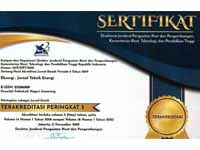Perancangan Boiler Mini Berbahan Bakar Biogas Dengan Berbagai Variasi Tekanan
DOI:
https://doi.org/10.32497/eksergi.v13i2.907Abstract
Potensi sampah di beberapa kota di Indonesia cukup melimpah dan belum dimanfaatkan secara optimal. Sampah perkotaan dengan teknologi terkini dapat dikonversi menjadi biogas. Biogas mempunyai potensi yang besar sebagai bahan bakar boiler. Boiler adalah instrumen pembangkit uap pada jumlah tertentu dengan tekanan dan temperatur tertentu. Tujuan penelitian ini adalah memperoleh rancangan boiler mini yang optimal yang dapat dipindahkan dengan variasi tekanan boiler dan laju alir biogas yang tetap pada 0,216 kg/s dan 0,012 kg/s. Rancangan boiler yang optimal mempertimbangkan persyaratan efisiensi termal netto lebih dari 20% dan persyaratan gas buang 100â°C-120â°C. Pembakaran biogas dirancang dengan penambahan udara berlebih. Perpindahan panas pada boiler sebagian besar terjadi secara konveksi. Hasil perancangan boiler dengan tekanan operasi 22 bar adalah panjang boiler 0,31 m dengan jumlah pipa 100. Boiler ini memiliki temperatur gas buang 112â°C dan efisiensi termal netto 20,9%.
References
Anggono, T., & Lestari, E, (2005) Peluang Konservasi Energi pada Peralatan Boiler, Puslitbangtek Ketenagalistrikan dan Energi Baru Terbarukan, Jakarta.
Incropera, F.P., (1996), Fundamentals of Heat and Mass Transfer 4th ed., John Wiley & Sons, New York.
Shields, C.D., (1961), Boiler, Mcgraw Hill Book Company, New York.
UNEP, (2006), Boilers and Fluid Thermic Heaters, United Nations Environment Programme.
Downloads
Published
Issue
Section
License
Authors who publish with this journal agree to the following terms:Authors retain copyright and grant the journal right of first publication with the work simultaneously licensed under a Creative Commons Attribution License that allows others to share the work with an acknowledgement of the work's authorship and initial publication in this journal.
Authors are able to enter into separate, additional contractual arrangements for the non-exclusive distribution of the journal's published version of the work (e.g., post it to an institutional repository or publish it in a book), with an acknowledgement of its initial publication in this journal.
Authors are permitted and encouraged to post their work online (e.g., in institutional repositories or on their website) prior to and during the submission process, as it can lead to productive exchanges, as well as earlier and greater citation of published work (See The Effect of Open Access).






